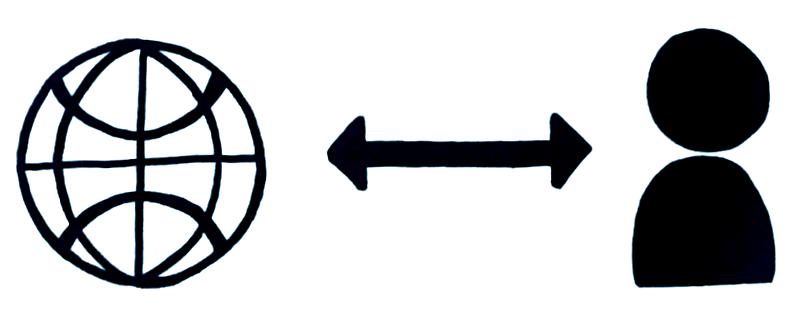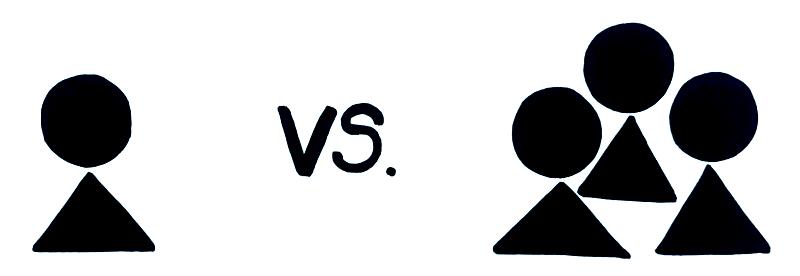This is how we roll:
The fallacies of human behaviour

We’re not how we think we are
When we make decisions – well-considered as they may seem – , we rarely base ourselves on purely rational arguments. Even so, we often think we do. That is to say, we make decisions under the ‘illusion of objectivity‘.
“[We] tend to see [ourselves] as being more objective, more even-handed, more insightful and less biased than [we] really are.”
Armor (1991, p.1)
Truth is: our rationality is bounded by limited cognitive abilities, limited information processing capacity and limited time at our disposal.
In fact, there is oftentimes a huge discrepancy between the complexity of the world that surrounds us and the complexity of the problems we face – on one hand – and our own ability to cope with this complexity – on the other hand – .

Mental short-cuts and biases
Psychologists and behavioural economists figured out that human beings find a way to deal with this discrepancy. They try to resolve it by making use of heuristics. Heuristics are basically ‘short-cuts’ or ‘rules of thumb’ our brain resorts to, in order to render decision making easier and quicker for us.
One commonly cited example of mental short-cut is the ‘availability heuristic’. It means making decisions or judgements based on the ease with which something comes to mind. In other words, because some instances or outcomes are more readily available in our memory, we infer they generally occur more commonly or frequently than others.
For example, if you recently heard of an airplane crash in the news, the headline is probably still on your mind when planning to book your next flight. If you believe now that airplanes are less safe and that you’d be better off travelling by car, you clearly overestimated the actual frequency of airplane accidents due to availability in your memory. (By the way, statistically speaking, airplanes are still much safer than cars).
Nevertheless, these heuristics (or automatic simplifiers) are generally sensible and helpful to cope with all sorts of issues we encounter in our lives. They save energy and time. Yet, they can be problematic, because they can lead to systematic cognitive biases, to false conclusions and mistakes.
Cognitive biases affect our perception of reality in an unconscious way by systematically deviating from rationality. The list of existing cognitive biases is quite massive. Still, I’d like to give you 2 relevant examples:
The status quo bias
This bias stands for the human preference to stick with the present state of affairs, in other words to maintain the status quo. Any change from that baseline is perceived as something negative or as a loss.
Consider the question of political change and electoral behaviour. People who favour preserving traditions and sticking to the status quo tend to identify with conservative or reactionist parties. Perhaps such vote avoids risks associated with change, but it also misses out on the possible benefits that change might bring about. And, it overlooks that change is inherent to our world: by nature no present state can be preserved forever.
The planning fallacy
This is the human tendency to underestimate the time that will be required to complete a task/project or likewise the time required to take a decision. Almost everyone knows the last minute hustle of wrapping up an essay or a work project right before due date. But importantly, you’ll spot the planning fallacy even when looking at more decisive matters, when the stakes truly are high. For instance, the Brexiteers (who voted to leave the EU) clearly underestimated the time and effort it would take to negotiate a deal with the EU that would also pass the House of Commons.
It is relatively easy to see why both the status quo bias and the planning fallacy are problematic. They are, insofar as they can slow down reforms or impede change and action as a whole.
Do it now, not later
Question 1: Do you frequently make resolutions about changing a bad habit in your life? Something like going to the gym regularly, eating healthy or being more productive?
Question 2: Do you stick to your resolutions?
No need to feel guilty, if you answered ‘yes’ to the first and ‘no’ to the second question. Most people do. And there is a compelling reason for this dichotomy:
When you fix yourself a goal or make a resolution, you project yourself into a future state (or even a far future state), i.e. you adopt a long term perspective. However, in order to achieve this imagined and desired state, you need to take actions today, in your present life. In other words, you have to pay a ‘price’ and make efforts NOW for something you will get benefits for only LATER. (Small disclaimer: Sometimes you cannot even be sure whether you’ll eventually get the benefits you were seeking).
For instance, you have to forgo the pleasure of eating an entire box of ice cream every day (in the short run), if you want to stay in shape in the long run. (Obviously this is a very simplified equation that doesn’t take into account any confounding factors, such as age, basal metabolic rate or physical activity level).

Sometimes goals seem so far apart and big, they almost look unfeasible from a present position. Other times, there is no clear consensus on how to reach a goal. How do you break a goal into small, manageable steps? How do you motivate yourself to work towards a goal that is miles away?
This ‘time frame problem’ is not just confined to self-discipline issues. It generally applies to a lot of complex questions at the level of society: How to implement the Paris agreement on climate or how to reach the 17 SDGs by 2030?
You vs society
When you throw away edible food instead of eating or donating it or when you commute by car instead of using public transportation: these are all instances of a ‘you vs society’ conflict. In other words, there are many instances, where, as individuals, we behave in a way that is neither socially responsible nor socially desirable.
Other times, individual behaviours that would benefit the public good are simply underprovided because they are of no priority to the individual itself. For instance, because their ecological footprint has no direct repercussions on their present lives, individuals often do not consider it a major concern to reduce their footprint.

In brief
What do all of the behavioural patterns and mechanisms I just presented have in common?
They point to the widespread misconceptions (or fallacies) of human behaviour. Our present behaviours have problematic adverse effects: they produce suboptimal decisions, unwanted outcomes and inertia. If we want to change the world for the better, we need to first seize how we roll as human beings and shape behaviour change accordingly.
Coming up next
I talk about how we can design and induce behaviour change.
Stay tuned ! 🐝
Written and published September 2019
by Jessica
List of references I used in this article:
Armor, D. A. (1999). The illusion of objectivity: A bias in the perception of freedom from bias. Dissertation Abstracts International: Section B: The Sciences and Engineering, 59(9-B), 5163.
Kahneman, D. (2011). Thinking, fast and slow.
Simon, H. (1967). Models of man: Social and rational: Mathematical essays on rational human behavior in a social setting. New York; London: John Wiley.
Thaler, R., Sunstein, C. (2008). Nudge. Yale University Press, New Haven
Tversky, A., & Kahneman, D. (1974). Judgement under uncertainty: Heuristics and biases. Science, 185, 1124-1131.